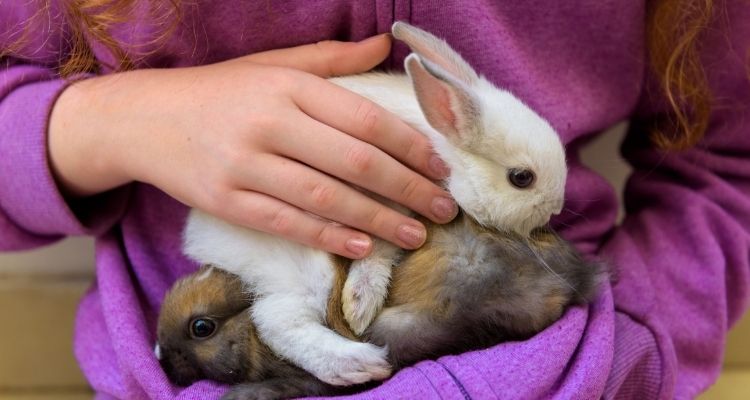Rabbits have been commonly kept as family pets for many centuries. Rabbits can adapt well to domesticated life, as well as be litter box trained.
Like all family pets, rabbits need regular care, attention and training. But this type of care is much different to cats and dogs.
Here are 9 bunny facts to consider before bringing a pet rabbit into your home.
Where to Buy a Rabbit
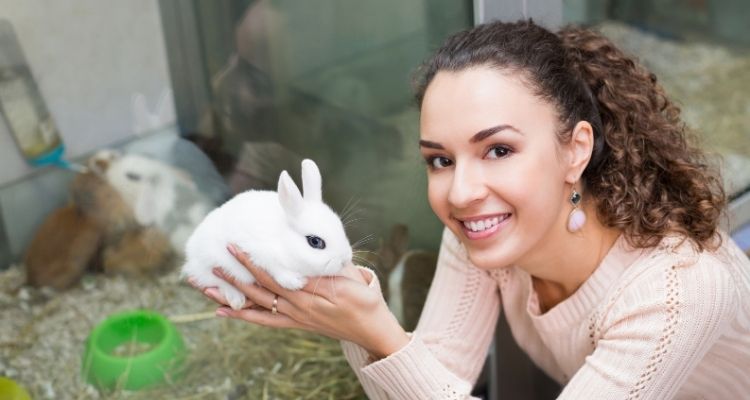
Most people choose to buy a rabbit from a breeder rather than the pet store. I’d like to encourage you to think about a third option – rabbit adoption. Each year millions of rabbits are euthanized in the USA, that are otherwise healthy, but have been surrendered or rescued.
Talk to your local adoption and rescue center or have a look online at Adopt a Pet.
Adoptapet.com is one option that brings together 17,000 different animal shelters and rescues. A not for profit pet adoption website, you can search for rabbits in your zip code, city or state and be rewarded with a multitude of bunnies that need rehoming.
For example, a quick search of rabbits in Texas zip code 75001, found 12 results within a 50 mile radius. There were 14 results for rabbits in Colorado and 18 results in the Sacramento area. I could go on for some time about the volume of results, but if you consider rabbit adoption you will be rehoming a bunny and saving a life.
Training a Rabbit
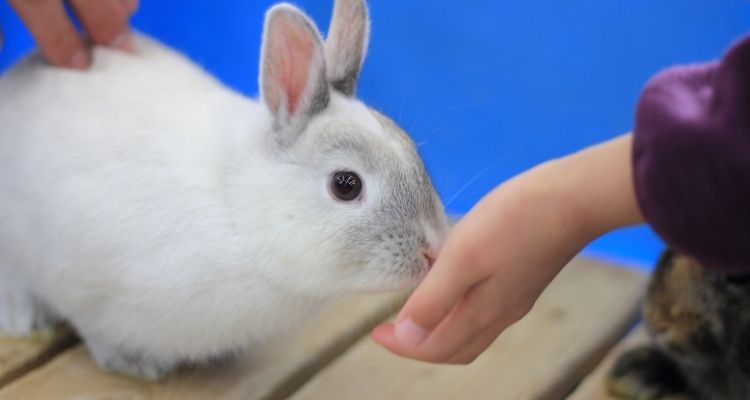
You can train a rabbit to go to the toilet in a litter box, a specific area of your home, or on newspaper and the like. Neutered or spayed rabbits are much easier to litter box train.
A rabbit will not understand a voice command (like dogs and puppies do) but will recognize various patterns of voice. Generally, rabbits will respond to either a high pitched sound or a deep voice command or sound.
If you use a bunnies name frequently, they will learn to recognize your voice sounds of the name and respond also. Rabbits are very smart creatures, who enjoy stimulation with toys and games as well.
Rabbits do not understand hand signals or voice commands like dogs and cats do. Never physically punish a rabbit, this will simply frighten and confuse your bunny who will not understand they have done something wrong.
Lifespan of a Rabbit
A rabbit is a long term commitment. Domesticated rabbits can live between 8 to 12 years. Consider if your family circumstances are prepared to keep a rabbit for this length of time, as well as provide food, toys, enclosures and veterinary care.
Dental Care for Rabbits

Did you know that rabbit teeth are constantly growing? Giving your rabbit some edible wood such as willow, hazel or apple woods as well as root vegetables and gnawing toys such as seagrass.
Veterinary Care for a Rabbit
A rabbit is considered an exotic small animal and not all veterinarians are able to adequately care for rabbits.
I encourage you to explore vets in your area and find one who is familiar with rabbits and rabbit care.
Rabbits are sensitive animals and medically, things can go wrong quickly. You want to know where to take your rabbit to for medical help if the need arises.
Pet Insurance is definitely something to consider for ongoing rabbit care.
Did You Know? 80% of female rabbits who have not been spayed and not had a litter of babies, develop uterine or ovarian cancer. If you plan to keep a female rabbit, and don’t plan to breed, please ensure she is spayed.
Rabbit Enclosures
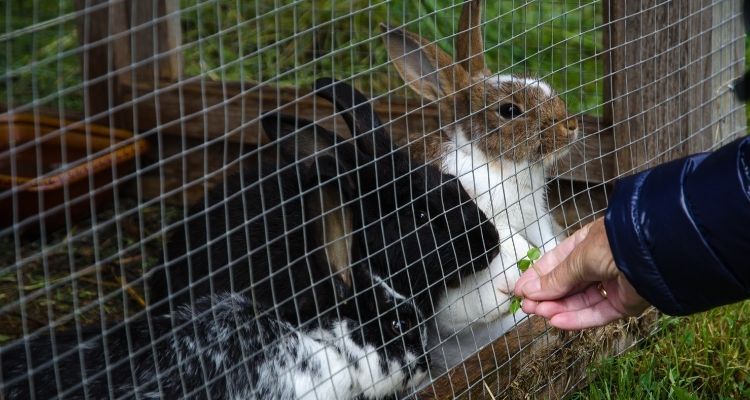
Before letting a rabbit loose in your home you will need to “rabbit proof” it. Rabbits love to chew and have no idea that low items such as electrical cords or wires aren’t theirs for the taking.
Whilst rabbits can be trained not to chew, it is important to keep your bunny in a confined space to begin with then give them supervised time to explore the house. Ensure you lift any low wires or cords up out of the reach of your rabbit.
A good way to start is with a spare room than can be turned into a rabbit den. They need plenty of space to run around. When rabbits are happy they will do a “binky” which is a high hop to show their happiness.
Rabbit hutches are a wonderful pen to lock your rabbit in overnight for sleeping, but really do not allow enough space for your rabbit to stay in permanently. Hutches were first introduced in the Victorian era when rabbits were a popular choice for meat.
A general rule of thumb is to allow enough height for your bunny to stand on its hind legs. They should also be able to hop three times in a row, so allow enough length in your rabbit enclosure for this. A recommended rabbit hutch size is at least 6ft long x 2ft wide and 2ft tall.
Companion Rabbits

Some rabbits have bonded (particularly when adopting from a shelter) and should not be separated. These rabbits should not be separated.
When considering housing multiple rabbits together, you should not pair two (or more) unneutered male rabbits together with female rabbits. They will fight for domination and will also be a major cause of stress for your bunnies.
Male and female rabbits that have not been spayed should not be paired together. Ever heard the term “breed like rabbits”? Rapid breeding will occur between unneutered male and female rabbits. Please consider the over population of rabbits in the USA and the huge number of rabbits in animal shelters before letting your rabbits breed.
Other Pets in Your Home
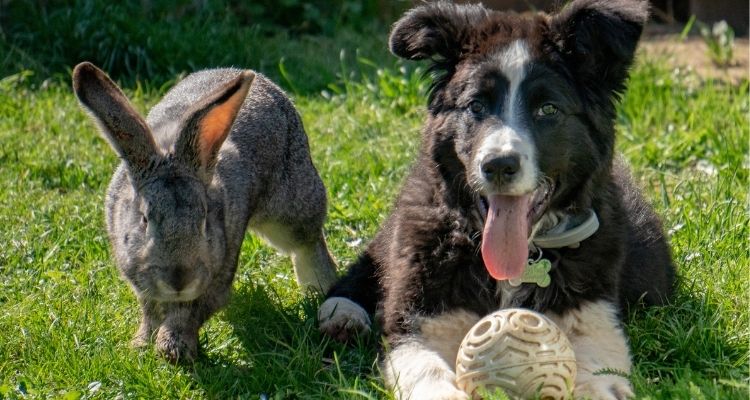
If you have a dog, no matter how gentle or friendly, please ensure it is never left alone with a rabbit. Their predatory instincts can kick in, or they could be over excited to play with the rabbit – both of which can cause serious harm.
Cats and rabbits generally pair well together and have the potential to become close companions.
Cats don’t usually have territorial concerns and tend to accept a rabbit into the home with ease. Having said that, cats should be monitored around rabbits, particularly if your cat is an outdoor cat and prone to hunting wild rabbits.
If you already have a rabbit and are considering buying a cat or kitten, it is possible the rabbit will show some aggression initially. This is a territorial display and the cat generally concedes to the rabbit.
Guinea pigs are other popular small animals often kept in the home. Whilst some publications will suggest keeping a rabbit and guinea pig together as companions, I do not. Guinea Pigs are not as social as rabbits, nor are they as interested in grooming each other, so this is not likely to benefit your rabbit.
Size differences between your rabbit and guinea pigs could also cause injuries to the guinea pig. They also have different nutritional needs, so should be fed separately. In short, it is much safer to keep rabbits and guinea pigs apart.
Cuddling A Bunny
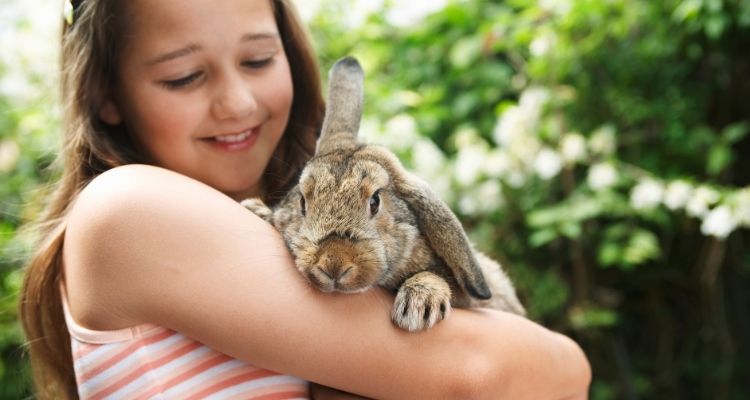
Picking a rabbit up in the air is a stressful and scary event for them. They are a prey animal, and like their feet firmly on the floor. Whilst you might be tempted to pick up your bunny and put it on your lap, it is best to get him or her accustomed to you first.
I don’t recommend letting children pick up rabbits, their hind legs are very strong and they can kick and jump. Both the child and the rabbit could end up scared and injured. Rabbits will also think that they are being attacked if they are suddenly lifted off the ground.
The best way to interact with your rabbit is to sit on the floor. They will come up to you and nudge you with their nose. They will most likely climb on you at which time you can gently stroke them.

